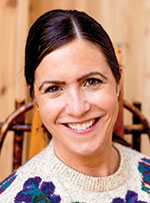Twenty Something / Christina Capecchi
Writing in the attic: the Catholic call to creativity
 Haley Stewart’s idea came in a dream. It was just like the movies, the fantasy of every writer who has slogged away at a keyboard, awaiting inspiration.
Haley Stewart’s idea came in a dream. It was just like the movies, the fantasy of every writer who has slogged away at a keyboard, awaiting inspiration.
“I woke up, and I was like: ‘I have to write this story! It was just given to me!’ ”
Through the years, the 36-year-old Catholic from Waco, Texas, had put in her share of toil and sweat as a freelance writer, juggling to meet deadlines as she homeschooled her four children.
“I’ve heard writers say this before, and I always thought they were making it up,” Haley said. “But that’s what it was like: I had these little characters pop into my head, and I just followed their lead and then there was a book.”
The characters were, indeed, little. They were mice. Specifically, they were mice nuns, and they lived under the floorboards of G.K. Chesterton’s home, where they ran a school and solved crimes. Mice detective nuns!
Haley could see them, and she loved them, and she was itching to write about them. But life was busy, and the mice detective nuns stayed in her head for several months.
Then COVID-19 struck, and the Stewart family quarantined. The only quiet place in the house was the attic, so Haley grabbed her laptop and climbed up, perched among boxes of Christmas decorations, off-season clothing and a kayak paddle.
It was time to tell the mice nuns’ story.
“It wrote itself,” Haley said. “It felt very much like this collaboration with God. I was given the opportunity to give something birth. It was just my fingers being used to type out the story that was already there.”
Before long, Haley was signing a contract with Pauline Books for a three-book series featuring her mice—the Sister Seraphina Mysteries. Logging in around 10,000 words, the first book, The Pursuit of the Pilfered Cheese, is a heavily illustrated storybook rather than a picture book. It will be published this fall.
In the meantime, Haley is plugging away at her non-fiction, which first garnered her a devoted readership. This month, Ave Maria Press will publish her book Jane Austen’s Genius Guide to Life: On Love, Friendship, and Becoming the Person God Created You to Be.
Come summer, she’ll be writing the third Sister Seraphina book and hopefully carving out time for a young-adult fantasy novel she’s drafted—her first work of fiction not aimed at children. New creative avenues keep opening up.
“There’s so much to learn,” said Haley, who shares updates on her website, carrotsformichaelmas.com.
She believes everyone is creative, though the overstimulation of modern life can squelch that spark. Her best remedies: going on a walk, chatting with a friend or praying at adoration, where she always brings a notebook.
“The silence creates this space where I suddenly have a million ideas,” Haley said.
Catholicism fosters creativity, offering a tradition replete with sacred art and a sensory-rich liturgy, she said. “It’s hard for me to separate out my Catholicism from my writing.”
Creativity is evident in everyday problem-solving: rearranging a room, turning the contents of a fridge into a meal, managing the flow of a party. And it is always a spiritual endeavor, a co-creation with God—an idea Haley has embraced ever since reading Madeleine L’Engle’s book Walking on Water: Reflections on Faith and Art.
“Creativity is participating in God’s image, as creator,” Haley said. “It’s being human, the way that God has wired us to be, like him.”
Sometimes, the first step of creativity is the hardest: slowing down and looking up.
“It comes down to wonder,” Haley said. “When we’re connected to God, we’re awake to the reality that the world is enchanted by the footsteps of God. When we’re awake to that truth, we’re more open to creativity.”
(Christina Capecchi is a freelance writer from Inver Grove Heights, Minn.) †
 Haley Stewart’s idea came in a dream. It was just like the movies, the fantasy of every writer who has slogged away at a keyboard, awaiting inspiration.
Haley Stewart’s idea came in a dream. It was just like the movies, the fantasy of every writer who has slogged away at a keyboard, awaiting inspiration.